FOCAC | China-Africa Cooperation: How Financing the Small and Beautiful Can Boost Green Mobility in Africa?
On September 3, 2024, the closed-door meeting "Financing the Small and Beautiful: The Future of Green Mobility in Africa" was held in Beijing. This meeting was jointly organized by the Institute of International Development of Cooperation (IIDC) of the Chinese Academy of International Trade and Economic Cooperation (CAITEC), the Climate Investment and Finance Committee of the Chinese Society for Environmental Sciences (CIFA), and CECEP Hundred Technical Service (Beijing) Co., Ltd. More than 40 representatives from institutions and enterprises including the United Nations Industrial Development Organization Investment and Technology Promotion Office (ITPO) Beijing, World Resources Institute (WRI), Ministry of Infrastructure Rwanda, CECEP Eco-Product Development Research Center, China-Africa Development Fund (CADF), Yarey Consultancy Group, Roam Company, and Yadea Technology Group Co., Ltd. attended the meeting. They had in-depth discussions on key topics such as locally led e-mobility solutions, innovative financing for "small yet smart" project with international cooperation. The meeting was moderated by YANG Lin, Deputy General Manager of CECEP Hundred Technical Service (Beijing) Co., Ltd.
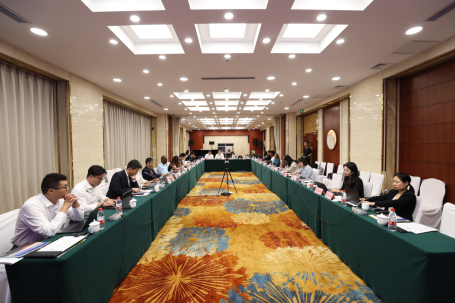
LIAO Yuan, Chairman of CECEP Eco-Product Development Research Center Co., Ltd. and Deputy Secretary-General of the Climate Investment and Finance Committee of the Chinese Society for Environmental Sciences, delivered the opening remarks. LIAO stated that as the continent with the highest concentration of developing countries, Africa faces significant challenges due to rapid urbanization and population growth, making green mobility a crucial issue. African nations are actively building a green transportation ecosystem consisting of electric vehicles, mobility services, infrastructure, and regulatory frameworks. Despite the broad prospects and proactive efforts from various parties, issues like funding shortages, inadequate infrastructure, limited financable projects, outdated technology, and low public awareness still hinder the development of green mobility in Africa. China's "Small and Beautiful" financing concept, characterized by its flexibility, low thresholds, and risk diversification, holds practical significance for China-Africa cooperation. It is recommended to support green mobility through creating a favorable policy framework and business environment for electric vehicles and new energy infrastructure, developing a diversified funding ecosystem with ample operational growth capital, and tailoring innovative and diversified financing solutions to local conditions.

Locally Led Innovative Solutions: Promoting E-mobility in Africa
The first panel discussion, moderated by Meron TESFAMICHAEL, Director of Africa Energy at WRI Africa, focused on innovative projects and locally led e-mobility solutions. Panelists included Steven BIHINDA, Renewable Energy Advisor at the Ministry of Infrastructure Rwanda (online), JIANG Hao, Head of Environment and Climate Issues at UNIDO Investment and Technology Promotion Office (ITPO) Beijing, and Marjorie SAINT-LOT, CEO of Yarey Consultancy Group.
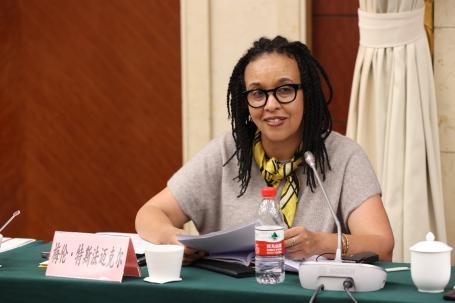
Panelists' Insights
Steven BIHINDA (online), Renewable Energy Advisor, Ministry of Infrastructure Rwanda
The Rwandan government is committed to reducing air pollution and carbon emissions through electric mobility to achieve sustainable development. Measures include developing charging infrastructure, implementing incentives to attract investment in the electric mobility sector, integrating renewable energy into charging infrastructure development, promoting electric motorcycles to address transportation issues, supporting local enterprises in importing and assembling electric equipment, and exploring innovative financing methods. However, Rwanda still faces challenges such as low penetration of electric motorcycles and inadequate charging infrastructure. Enhancing cooperation with other countries and international organizations, sharing experiences and resources, and improving local technology and production capabilities through technology transfer and knowledge sharing can enhance the promotion and application of green mobility.
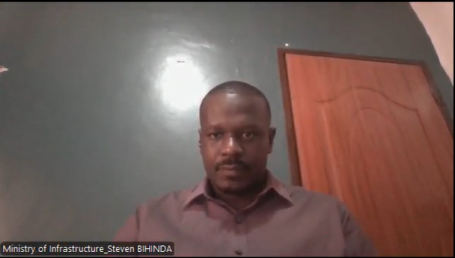
JIANG Hao, Head of Environment and Climate Issues, UNIDO Investment and Technology Promotion Office (ITPO) Beijing
Chinese automakers and other types of enterprises are facing intense domestic competition, pushing them to seek new markets and opportunities, with Africa becoming a key target. However, Chinese enterprises must fully consider the actual situation of the African market, including infrastructure, consumer preferences, and policy environment. Industrialization is a necessary path for Africa to achieve rapid economic development. Through industrialization, African countries can enhance their production capacity and advance their technology, thereby gaining a more favorable competitive position in the global market. The international community should increase support for African industrialization by providing necessary funding and technical assistance to help African countries establish a complete industrial system.
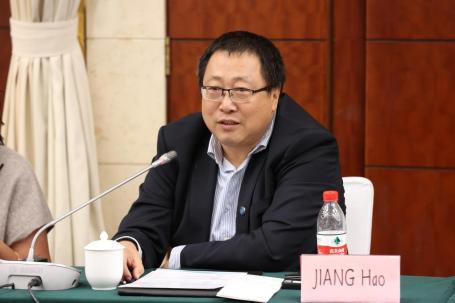
Marjorie SAINT-LOT, CEO of Yarey Consultancy Group
The electric mobility market in West Africa has enormous potential but also faces many challenges, with the lack of infrastructure, including charging and battery swapping stations, being one of the biggest challenges. The key to addressing this issue lies in innovative financing methods and business models to attract more private sector participation. Financial inclusion plays a vital role in supporting the development of green mobility in Africa. In the African region, many people lack access to financial services, limiting their ability to purchase and use electric vehicles and other green transportation tools. Therefore, improving financial inclusion through innovative financial products and services, such as microloans and mobile payments, can enable more people to enjoy the convenience of green mobility.
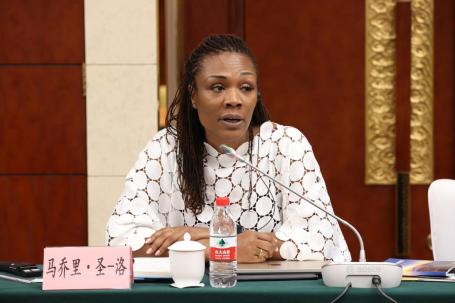
Focus on Innovative Financing: Exploring Financing for Small and Beautiful Projects with International Cooperation
The second panel discussion, moderated by LIU Shuang, Acting Director of Finance and Private Sector at the Climate, Economics and Finance Program (CEF) of WRI, had an in-depth exchange of insights on innovative financing for small yet smart projects with international cooperation. Panelists included Rebekah SHIRLEY, Regional Deputy Director at WRI Africa, Hans Van Toor (online), Strategy Director of Roam, WANG Hao, General Manager of International Sales Company at Yadea Technology Group Co., Ltd., and KANG Kaiyu, Deputy Managing Director at Investment Department I of China-Africa Development Fund (CADF).
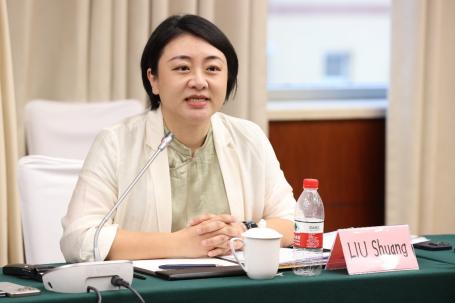
Panelists' Insights:
Rebekah SHIRLEY, Regional Deputy Director, WRI Africa
The development of electric mobility in Africa is rapid, especially in East Africa, where the electrification rate is expected to grow from 2%-3% to 40% by 2040. Two-wheelers, especially motorcycles, hold a significant position in the African market. However, challenges such as vehicle range, battery life, charging infrastructure, and high initial investment costs still exist. WRI supports electric vehicle projects in cities like Addis Ababa and Kampala to improve safety and electrification rates. Additionally, WRI is involved in the Nationally Appropriate Mitigation Actions (NAMA) project to support electric vehicle solutions through domestic guarantee funds. She looks forward to further exploring the African market in partnership with Chinese entities, and promoting financial innovations.
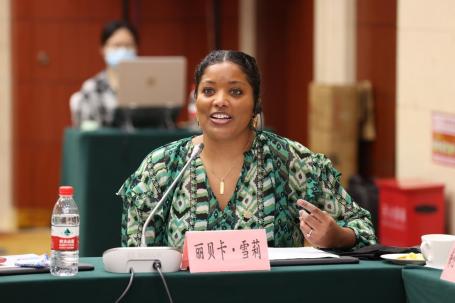
Hans Van Toor, Strategy Director of ROAM (online)
The electrification rate in East Africa is expected to grow rapidly, especially in countries like Kenya, Uganda, and Tanzania. However, this growth brings challenges, including insufficient power supply, inadequate infrastructure, and a low level of consumer awareness for electric vehicles. Roam Company has been innovating technology and actively seeking global partnerships. Currently the company witnesses an increase in financing opportunities and a decline in interest rates. The cost of electric vehicles is decreasing, and Kenya's renewable energy growth has reached 92%, while fuel prices are rising. Like Kenya, many West African governments are implementing policies to support the development of electric motorcycles. These measures are expected to boost economic growth and job creation in the region. Roam Company is willing to deeply cooperate with China related to supply chain, technology transfer and R&D, market expansion and brand building, and infrastructure construction.
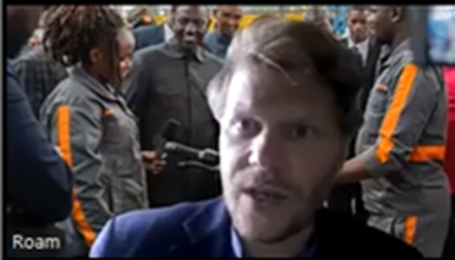
WANG Hao, General Manager of International Sales Company, Yadea Technology Group CO., Ltd.
The African market has a huge demand for electric two-wheelers, especially in countries like Uganda, Kenya, and Morocco. Yadea has undertaken a series of deployments in the African market and formulated corresponding product strategies, with technological innovation playing a crucial role. Yadea's financing and market expansion strategies in Africa include cooperation with local financial institutions, providing installment payment schemes, and obtaining support through government projects. Yadea is willing to explore new financing models with African partners to reduce consumers' vehicle purchase costs.
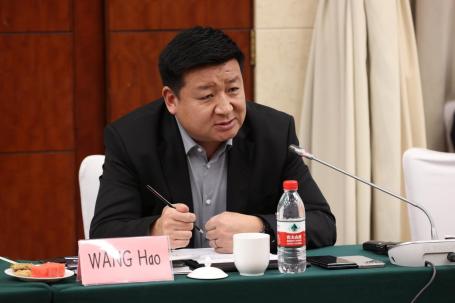
KANG Kaiyu, Deputy Managing Director, Investment Department I, China-Africa Development Fund (CADF)
Africa's insufficient power supply is the biggest obstacle to its economic development, with numerous issues in transmission, generation, and distribution leading to low electricity access rates and severely affecting enterprise productivity. CADF's specific measures to promote green mobility and renewable energy include investing in photovoltaic and wind power stations, supporting manufacturing enterprises, and promoting infrastructure construction. Africa possesses abundant critical mineral resources like copper, cobalt, and lithium, which are vital for electric vehicle production. Electric mobility will become an important trend in the future. CADF will continue exploring new financing models and investment opportunities to support green mobility and renewable energy projects in Africa.
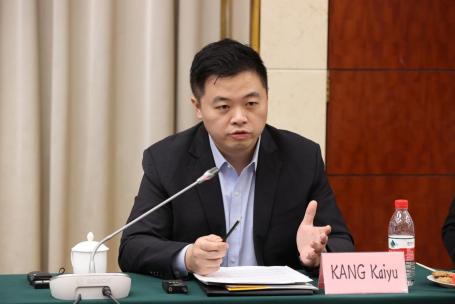
The meeting highlighted the importance of international cooperation in advancing green mobility in Africa and called on all parties to work together to promote green mobility and achieve sustainable development across the African continent.